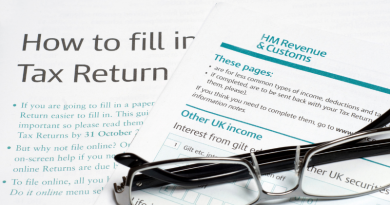Give yourself a financial MOT
Money makes the world go round, or so they say. It’s certainly important and whether you like it or not, its something you can’t avoid. Some people bury their head in the sand at the thought of dealing with their personal and family finances, but ignore it at your peril.
You work hard for your money and why not make your money work hard for you?
Here are some of the areas to look at when doing a financial review – hopefully it provides some pointers to give you a better understanding of where you are at and potentially highlight areas for improvement.
Rainy days
Have you got some money set aside for that unexpected bill or event? Ideally this pot would cover 3-6 months of expenses to give you and your family the best chance of getting through that period of time, without having to worry too much about short term finances.
If you haven’t don’t panic – but make it a high priority to sort.
Pensions
Pensions provide a tax efficient ‘wrapper’ to help fund your future lifestyle. It’s a good idea to make sure you know what you’ve got, where it is and how it is performing.
Find your most recent statement and / or log on to your provider(s) portal.
- What’s the value of the pension?
- What is it invested in and what have returns been over the last year / 3 years / 5 years?
- Repeat as necessary!
Across your pensions, how much have you contributed? Do you have some spare cash? You could potentially contribute to your pension & get tax relief, effectively boosting your pension for free. There are restrictions and rules, but for many people, the main rules to be mindful of are
- You can only contribute up to £40,000 or your relevant earnings per tax year
- You can make additional contributions above £40,000 using ‘carry forward’ rules:
- if you contributed £20,000 in 2019/20, then you have £20,000 still remaining to use – but only if you have earnings >£40,000 and have fully utilised the current tax year allowance
- Don’t forget money in your pension scheme is tied up and cannot be accessed before the age of 55 currently, so don’t make additional contributions unless you’re happy to tie up that money
Consolidating pensions schemes can often make sense, but equally, you may have a pension that has benefits that you’d lose if you were to transfer. So make sure you check out what benefits you may have.
Otherwise, by consolidating, you’re reducing administration and possibly fees too and allows you to keep things invested in a similar manner. You could move the pots to current workplace scheme, or open a Self Invested Personal Pension (SIPP). SIPPs typically offer more choice in terms of investment opportunities and also ability to access your pension flexibly in future.
State Pension
Please don’t ignore it. Get a state pension forecast at gov.uk: https://www.gov.uk/check-state-pension
You need 35 years of National Insurance contributions to get the full new state pension. This would be worth around £9,000 per year. If you have some missing years, it is possible to buy them back (sometimes up to 10 years prior) and it often makes financial sense to do so.
Whilst the state pension offers a relatively modest income, it will increase year after year and will be payable for the rest of your life. That is absolutely not to be sniffed at.
ISAs
These are tax efficient wrappers, in which to hold cash or investments. ISAs can grow free from income tax and capital gains tax and you can withdraw the money at any time without any further tax due.
So, similar to pensions, take an interest…
- What have you got, where is it?
- What is it invested in (assuming it’s not cash)
- What do you plan to do with it?
Stocks & Shares ISAs arguably offer the widest range of investment opportunities and potentially growth over the long term, but that comes with higher risk and the requirement to select the investments too.
Cash ISAs are lower risk from an investment perspective, but the returns are typically lower as well, meaning the risk is that your money is effectively losing value, as the price of goods increase.
Lifetime ISAs (LISAs) are a potentially useful option – if you are under 40 years old, you can open one. You can contribute up to £4,000 per tax year, which takes part of the £20,000 overall ISA allowance. The benefit with LISAs is that the government boost that contribution by 25%, so your £4,000 becomes £5,000! What’s not to like? Well there are some rules…
- You can’t withdraw that money before you’re 60 unless it’s used towards buying your first home
- If you want to withdraw it earlier or for another reason, there is a 25% penalty
Don’t forget Junior ISAs. Everyone (pretty much!) has an annual ISA entitlement, including children. Adults have £20,000 each and children (<18) have £9,000 each. Children aged 16 & 17 get both the child & adult allowances, hence can put £29,000 into ISAs when they are aged 16 and 17.
If you don’t contribute to an ISA within a tax year, you lose that entitlement.
Personal insurance
Have you got a mortgage? Are you renting a house? The answer is probably yes to one of them. Would you be able to pay these costs and keep a roof over your head, should something unforeseen happen – e.g. should someone in the family get injured, sick or even worse, die.
- Life Insurance and Family Income benefit insurance provide cover that could step in to provide financial assistance in the event of a death
- Critical Illness provides a tax free lump sum in the event of you suffering a serious illness (e.g. cancer / heart attack)
- Income protection can provide a tax free income if you’re unable to work due to becoming ill or injured
If you own your business, it is sometimes beneficial to have these insurance products setup through the limited company, from a financial/tax perspective.
Wills
Have you got a will?
According to a survey in December 2020, nearly 60% of adults in the UK do not have a will. It appears to be linked to the idea that ‘it won’t happen to me’. Surely you would rather have an element of control over what happens to your estate should the worst happen?
If you’re not married or in a civil partnership, your partner has no rights to the estate whatsoever, without a will being in place. Even if you are married and there is no will, the rules of intestacy kick-in and determine who is entitled to what. That could be out of kilter with your wishes.
Get a will in place!
There are a myriad of matters to consider when thinking ahead for your finances, but if you take the time to run through these items, you will have made a big step forward.
[This article is for general information and does not constitute any form of advice or recommendation]
Originally posted 2021-01-08 17:32:08.
- What to consider when choosing professional advice - February 3, 2026
- What you need to know about your pension - December 28, 2025
- Getting your financial life in order - November 12, 2025






